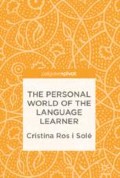Abstract
This chapter discusses the need for Second Language Acquisition to go beyond the purely linguistic in the communicative experience by bringing to the light the so far obscured dimensions of the personal and experiential in language learning. This chapter introduces a new theoretical kit to address this challenge, by drawing on philosophical thought that throws light on complex and rich understandings of the subject as a sentient, agentive and creative human being. In such a view, and in contrast to the linearity of more rationalistic approaches to the subject, language learning is seen as a way of applying a subversive stance on the self; of taking risks and multiple non-linear paths of development. Philosophical schools of thought, Romanticism, Aestheticism, Phenomenology and Nomadism, will be invoked in order to understand the subject as both a fractured self and as a subject in progress. It will be argued that by learning a new language, language learners do not only satisfy themselves by looking at the linguistic, but they also engage in heightened perception, myth-making and the challenging of their habitual intellectual surroundings and usual conventions.
Access this chapter
Tax calculation will be finalised at checkout
Purchases are for personal use only
References
Abrams, M. H. (1953). The Mirror and the Lamp: Romantic Theory and Critical Tradition. Oxford: Oxford University Press.
Benesch, S. (2012). Considering Emotions in Critical English Language Teaching: Theories and Praxis. London: Routledge.
Benjamin, W. (1983). Charles Baudelaire: A Lyric Poet in the Era of High Capitalism (trans: Zohn, H.). London: Verso.
Braidotti, R. (1994). Nomadic Subjects: Embodiment and Sexual Difference in Contemporary Feminist Theory. New York: Columbia University Press.
Bullock, A., & Trombley, S. (2000). The New Fontana Dictionary of Modern Thought. London: Harper Collins.
Busch, B. (2014). Linguistic Repertoire and Spracherleben, the Lived Experience of Language. Working Papers in Urban Languages and Literacies, 145. London: King’s College London.
Butler, J. (1990). Gender Trouble. New York: Routledge.
Byram, M. (1997). Teaching and Assessing Intercultural Communicative Competence. Clevedon: Multilingual Matters.
Byram, M. (2010). Linguistic and Cultural Education for Bildung and Citizenship. The Modern Language Journal, 94, 317–321.
Coffey, S. (2010). Modern Language Learning as a Figured World of Privilege. In J. Fenoulhet & C. Ros i Solé (Eds.), Mobility and Localisation in Language Learning. Bern: Peter Lang.
Cronin, M. (2000). Across the Lines: Travel, Language and Translation. Cork: Cork University Press.
Dewaele, J. M. (2004). The Emotional Force of Swearwords and Taboo Words in the Speech of Multilinguals. Journal of Multilingual and Multicultural Development, 25(2–3), 204–222.
Dewaele, J. M., & Pavlenko, A. (2002). Emotion Vocabulary in Interlanguage. Language learning, 52(2), 263–322.
Dewaele, J. M., & Wei, L. (2012). Multilingualism, Empathy and Multicompetence. International Journal of Multilingualism, 9(4), 1–15.
Frisby, D. (1994). The Flâneur in Social Theory. In K. Tester (Ed.), The Flâneur (pp. 81–110). London: Routledge.
Humboldt Wilhelm von. 1793/1794/2000. 2000. Theory of Bildung. In Westbury et al., 57–61.
Kinginger, C. (2004a). Bilingualism and Emotion in the Autobiographical Works of Nancy Houston. Journal of Multilingual and Multicultural Development, 25(2/3), 159–178.
Kinginger, C. (2004b). Alice Doesn’t Live Here Anymore: Foreign Language Learning and Identity Reconstruction. In A. Pavlenko & A. Blackledge (Eds.), Negotiation of Identities in Multilingual Contexts (pp. 219–242). Clevedon: Multilingual Matters.
Kramsch, C. (2009). The Multilingual Subject. Oxford: Oxford University Press.
Leung, C., & Scarino, A. (2016). Reconceptualizing the Nature of Goals and Outcomes in Language/s Education. Modern Language Journal, 100, 81–95.
Merleau-Ponty, M. (1945/2012). Phenomenology of Perception. London: Routledge.
Norton, B. (2000). Identity in Language Learning: Gender, Ethnicity and Educational Change. London: Longman.
Phipps, A. (2007). Learning the Arts of Linguistic Survival: Languaging, Tourism, Life. Clevedon: Channel View.
Phipps, A., & González, M. (2004). Modern Languages: Learning and Teaching in an Intercultural Field. London: Sage.
Piller, I., & Takahashi. (2013). Language, Migration and Human Rights. In R. Wodak, B. Johnstone, & P. Kerswill (Eds.), The SAGE Handbook of Sociolinguistics (p. 583).
Ros i Solé, C. (2013). Cosmopolitan Speakers and Their Cultural Cartographies. The Language Learning Journal, 41(3), 326–339.
Ros i Solé, C., & Fenoulhet, J. (2013). Romanticising Language Learning: Beyond Instrumentalism. Language and Intercultural Communication, 13(3), 257–265.
Author information
Authors and Affiliations
Copyright information
© 2016 The Author(s)
About this chapter
Cite this chapter
Solé, C.R.i. (2016). Lines of Thought. In: The Personal World of the Language Learner. Palgrave Pivot, London. https://doi.org/10.1057/978-1-137-52853-7_3
Download citation
DOI: https://doi.org/10.1057/978-1-137-52853-7_3
Published:
Publisher Name: Palgrave Pivot, London
Print ISBN: 978-1-137-52852-0
Online ISBN: 978-1-137-52853-7
eBook Packages: Social SciencesSocial Sciences (R0)

